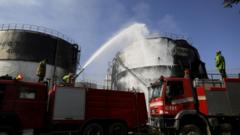As negotiations for a ceasefire in Gaza enter their final stages, a Palestinian official has shared a phased plan for the release of hostages in line with Israeli troop withdrawals. The resumption of mediation by the US, Qatar, and Egypt coincides with heightened diplomatic activity in the region, hinting at a possible agreement after months of stalemate.
Progress in Gaza Ceasefire Negotiations: Hostage Release Plan Under Discussion

Progress in Gaza Ceasefire Negotiations: Hostage Release Plan Under Discussion
Israeli and Palestinian negotiators appear to be closing in on a ceasefire agreement, according to insights from a senior Palestinian official, as multilateral mediation efforts resume.
Negotiations aimed at establishing a ceasefire in Gaza appear to be approaching a critical conclusion, with a senior Palestinian negotiator revealing that talks are in a "decisive and final phase." Reports indicate a growing willingness from both Israel and Hamas to reach a deal after prolonged deadlock, with Israeli Defense Minister Israel Katz reporting that an agreement is closer than it has been in recent months.
Mediation efforts have been revitalized by the involvement of the US, Qatar, and Egypt, all working to facilitate discussions that have reignited hopes for resolution in the 14-month conflict. A working-level delegation from Israel is currently in Doha, reflecting heightened diplomatic activity throughout the region.
The proposed three-phase plan would initially prioritize the release of civilians and women hostages held in Gaza, allowing Israeli troops to withdraw from urban centers and key transport routes. The plan outlines the establishment of mechanisms for displaced residents to return to northern Gaza, followed by successive stages that would see the remaining hostages freed and an ultimate cessation of hostilities.
Reports suggest that of the 96 hostages currently in Gaza, 62 are assumed by Israeli officials to be alive. The framework for negotiations aligns with a proposal made by US President Joe Biden in May, although significant details remain to be finalized. A previous round of talks in October saw a short-term ceasefire proposal rejected by Hamas.
Katz's recent comments to the Israeli parliament, expressing a need for security control over Gaza post-conflict, could pose challenges for negotiators seeking to unify positions with Hamas. His firm stance on preventing any resurgence of terrorist activities is indicative of pressures faced within the Israeli government from far-right cabinet members.
The conflict erupted following a surprise attack by Hamas on Israeli territory on October 7, resulting in significant casualties and abductions. Since then, more than 100 hostages have been released through various means, including negotiations and military actions.
Emerging diplomatic efforts are further spurred by recent developments in US politics with Donald Trump’s ongoing influence. Trump has urged for an urgent ceasefire agreement to be reached before the transition of power, emphasizing heightened stakes in the negotiation landscape.
As the humanitarian crisis continues to escalate in Gaza, with extensive casualties estimated by international observers, the urgency for a ceasefire agreement has never been more pressing.



















